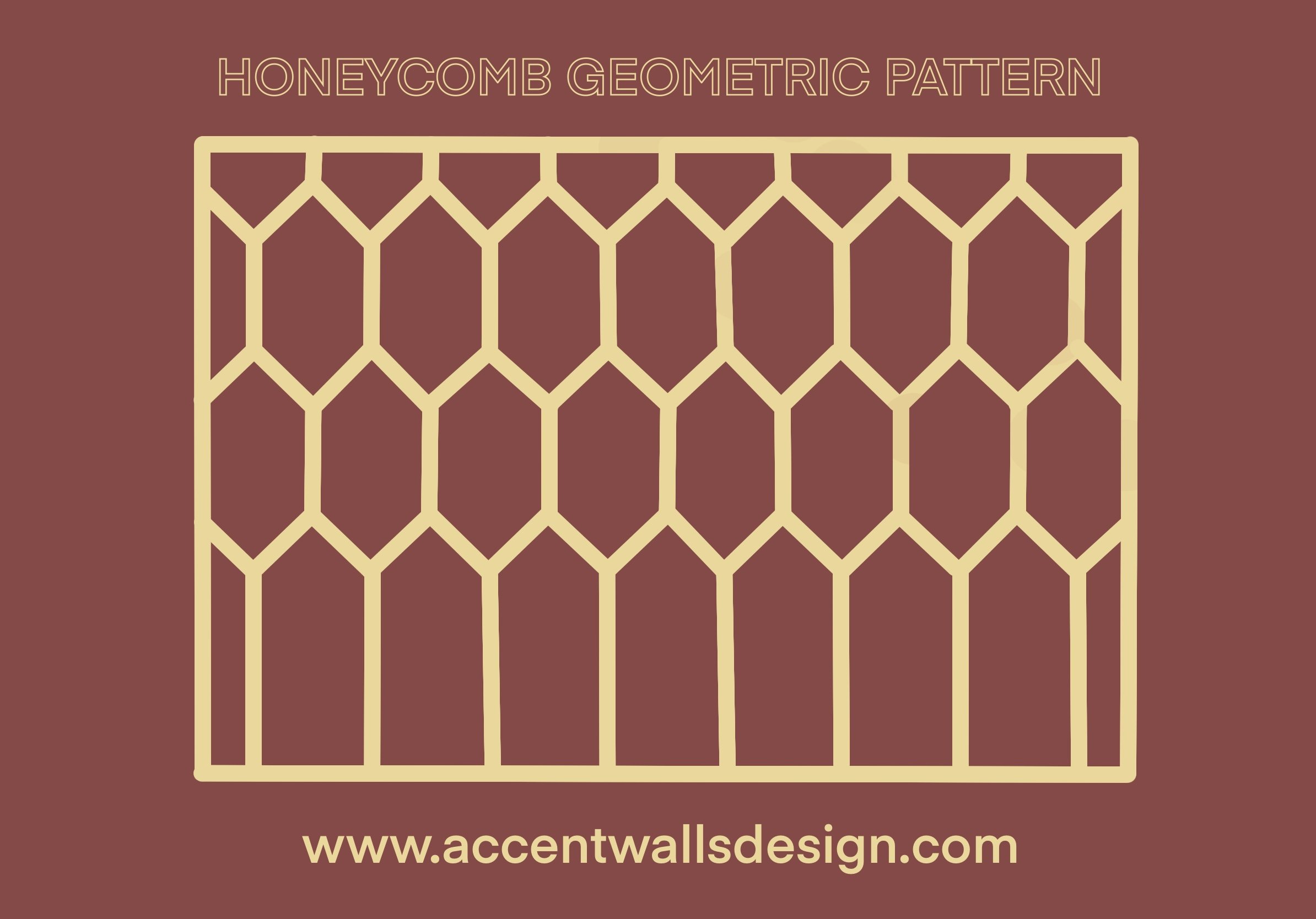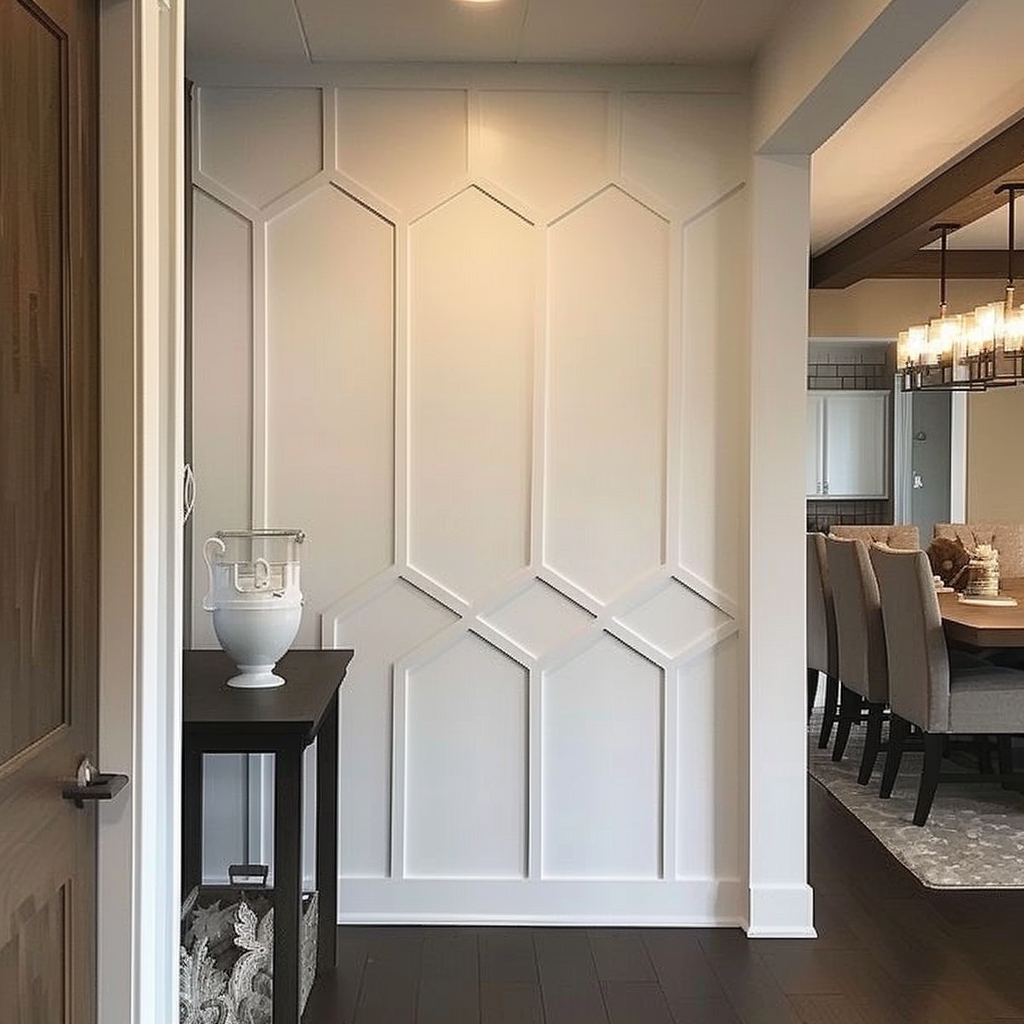Honeycomb Pattern for Board and Batten Accent Walls
The honeycomb pattern, inspired by the hexagonal cells of a beehive, is a versatile and visually appealing design choice for board and batten accent walls. Here’s a detailed look at how to incorporate this geometric pattern:
Honeycomb Pattern Characteristics
• Hexagonal Shapes: The pattern is characterized by its use of repeating hexagons.
• Symmetry: The regular, symmetrical arrangement creates a balanced and harmonious look.
• Texture and Depth: The pattern can add both visual and tactile texture to a wall.
• Versatility: Can be adapted to various styles, from modern to rustic, depending on the materials and colors used.
Design Concepts
1. Classic Honeycomb: Uniform hexagons evenly spaced across the wall.
2. Randomized Honeycomb: Varying sizes of hexagons for a more dynamic and organic look.
3. Layered Honeycomb: Hexagons placed at different depths to create a three-dimensional effect.
4. Color Variations: Using different colors or shades within the hexagons to add visual interest and complexity.
Steps to Create a Honeycomb Board and Batten Accent Wall
1. Planning and Design:
• Sketch the wall layout or use design software to visualize the honeycomb pattern.
• Measure the wall and decide on the size and spacing of the hexagons.
2. Materials Needed:
• Battens (wood, MDF, or PVC).
• Saw for cutting battens into hexagonal shapes.
• Sandpaper for smoothing edges.
• Nails or adhesive for attaching battens to the wall.
• Paint and primer for the wall and battens.
3. Preparation:
• Measure and mark the wall to outline where each hexagon will go.
• Cut the battens into precise hexagonal shapes. A template or jig can be helpful for consistent shapes.
4. Installation:
• Start from a central point or a corner and work outward to maintain symmetry.
• Attach the battens to the wall, forming the hexagonal pattern. Use a level to ensure alignment.
• Secure each batten with nails or adhesive, making sure they are flush with the wall.
5. Finishing:
• Sand any rough edges or uneven spots.
• Prime and paint the wall and battens if desired. Painter’s tape can help create clean lines between different colors.
Tips for Success
• Precision: Accurate measurement and cutting are crucial for creating uniform hexagons.
• Symmetry: Maintaining a consistent pattern is key to achieving a harmonious look.
• Color Choices: Consider a mix of contrasting or complementary colors to enhance the visual effect.
• Scale: Adjust the size of the hexagons to fit the scale of the room and wall.
Benefits of Honeycomb Patterns in Board and Batten Walls
• Visual Interest: Adds a unique and striking visual element to any room.
• Textural Depth: The pattern can add depth and dimension, especially when using varied thicknesses.
• Customizable: Highly customizable in terms of size, color, and arrangement.
Example Ideas
1. Modern Elegance: Use a single color for a clean, modern look with subtle texture.
2. Rustic Charm: Natural wood hexagons for a warm, rustic feel.
3. Vibrant Accents: Brightly colored hexagons to create a lively and playful wall.
4. Monochrome Sophistication: Shades of one color for a sophisticated and cohesive design.
Practical Applications
• Living Rooms: Create a statement wall that serves as a focal point and conversation piece.
• Bedrooms: Add a cozy and stylish backdrop to a bed or seating area.
• Home Offices: Enhance a workspace with a pattern that inspires creativity and productivity.
• Bathrooms and Kitchens: Use moisture-resistant materials and finishes to incorporate the honeycomb pattern in these spaces for added texture and interest.
Implementation Tips
• Template Use: Create or buy a hexagon template to ensure all pieces are uniform.
• Layering: Consider layering hexagons at different depths for a 3D effect.
• Lighting: Use lighting to highlight the texture and create shadows that enhance the pattern.
The honeycomb pattern for board and batten accent walls is a stylish and versatile option that can transform a space, adding depth, texture, and a contemporary feel. Whether you choose a uniform design or a more dynamic arrangement, this pattern is sure to make a statement.













